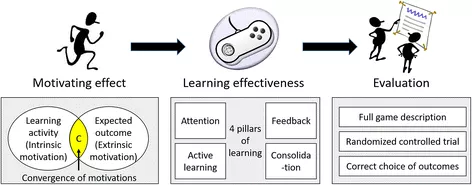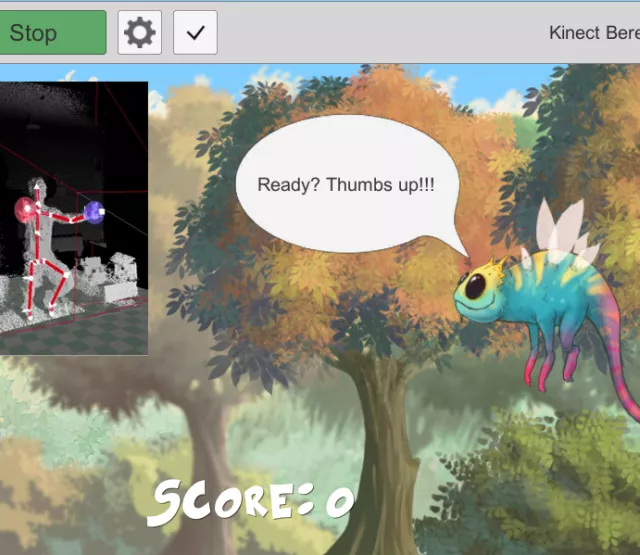
Förderjahr 2016 / Stipendien Call #11 / ProjektID: 1938 / Projekt: Interpreting Game-Scores and Data of Serious Games for Health using Decision Support Systems
Serious Games for Health kombiniert zwei thematische Nischen: einerseits Entertainment Computing / Serious Games und andererseits Medizininformatik. Die Kombination ergibt ein spannendes Forschungsfeld. Ein kurzer Überblick von aktuellen Papers.
Eine Literatursuche zu den Themen Serious Games for Health und Gamification von mHealth hat einige spannende Ergebnisse gebracht. Dieser Blogbeitrag gibt eine kurze Übersicht und fasst die gefundenen Papers zusammen.
Design and evaluation of a pervasive coaching and gamification platform for young diabetes patients
R. Klaassen et al., Design and evaluation of a pervasive coaching and gamification platform for young diabetes patients. Sensors (Switzerland). 18 (2018), doi:10.3390/s18020402.
Self monitoring, personal goal-setting and coaching, education and social support are strategies to help patients with chronic conditions in their daily care. Various tools have been developed, e.g., mobile digital coaching systems connected with wearable sensors, serious games and patient web portals to personal health records, that aim to support patients with chronic conditions and their caregivers in realizing the ideal of self-management. We describe a platform that integrates these tools to support young patients in diabetes self-management through educational game playing, monitoring and motivational feedback. We describe the design of the platform referring to principles from healthcare, persuasive system design and serious game design. The virtual coach is a game guide that can also provide personalized feedback about the user’s daily care related activities which have value for making progress in the game world. User evaluations with patients under pediatric supervision revealed that the use of mobile technology in combination with web-based elements is feasible but some assumptions made about how users would connect to the platform were not satisfied in reality, resulting in less than optimal user experiences. We discuss challenges with suggestions for further development of integrated pervasive coaching and gamification platforms in medical practice.
Klaassen et al. haben eine Plattform für junge Diabetes-Patienten vorgestellt, mit welcher sie über Lernspiele, Datenmonitoring und motivierendem Feedback Unterstützung in der Behandlung ihrer Krankheit erhalten sollen. Der Kernaspekt ist ein virtueller Coach, der sowohl die Spielfortschritte als auch die Gesundheitsdaten bewertet. Einige Schwierigkeiten gab es bezüglich des User-Interfaces, bei dem die Autoren für Verbesserungen ansetzen wollen.
Serious games for mental health: Are they accessible, feasible, and effective? A systematic review and meta-analysis
H. M. Lau, J. H. Smit, T. M. Fleming, H. Riper, Serious games for mental health: Are they accessible, feasible, and effective? A systematic review and meta-analysis. Frontiers in Psychiatry. 7 (2017), , doi:10.3389/fpsyt.2016.00209.
INTRODUCTION The development and use of serious games for mental health disorders are on the rise. Yet, little is known about the impact of these games on clinical mental health symptoms. We conducted a systematic review and meta-analysis of randomized controlled trials that evaluated the effectiveness of serious games on symptoms of mental disorder. METHOD We conducted a systematic search in the PubMed, PsycINFO, and Embase databases, using mental health and serious games-related keywords. Ten studies met the inclusion criteria and were included in the review, and nine studies were included in the meta-analysis. RESULTS All of the serious games were provided via personal computer, mostly on CD-ROM without the need for an internet connection. The studies targeted age groups ranging from 7 to 80 years old. The serious games focused on symptoms of depression (n = 2), post-traumatic stress disorder (n = 2), autism spectrum disorder (n = 2), attention deficit hyperactivity disorder (n = 1), cognitive functioning (n = 2), and alcohol use disorder (n = 1). The studies used goal-oriented (n = 4) and cognitive training games (n = 6). A total of 674 participants were included in the meta-analysis (380 in experimental and 294 in control groups). A meta-analysis of 9 studies comprising 10 comparisons, using a random effects model, showed a moderate effect on improvement of symptoms [g = 0.55 (95% confidence interval 0.28-0.83); P < 0.001], favoring serious games over no intervention controls. DISCUSSION/CONCLUSION Though the number of comparisons in the meta-analysis was small, these findings suggest that serious gaming interventions may be effective for reducing disorder-related symptoms. More studies are needed in order to attain deeper knowledge of the efficacy for specific mental disorders and the longer term effects of this new type of treatment for mental disorders.
Lau et al. haben Serious Games im Feld der Psychologie untersucht: speziell die Frage, wie effektiv der Einsatz von SGF(m)H sind, wurde untersucht. Sie kommen zu dem Schluss, dass eine leichte Verbesserung diverser Symptome erkennbar ist. Die Tatsache, dass die meisten behandelten Games auf CD-ROM ohne Internetunterstützung angeboten wurde, legt den Schluss nahe, dass die Spiele bereits einige Jahre alt sind. Eine neuere Untersuchung mit Fokus auf neueren Medien wäre also wünschenswert.
Serious games and gamification for mental health: Current status and promising directions
T. M. Fleming et al., Serious games and gamification for mental health: Current status and promising directions. Frontiers in Psychiatry. 7 (2017), doi:10.3389/fpsyt.2016.00215.
Computer games are ubiquitous and can be utilized for serious purposes such as health and education. "Applied games" including serious games (in brief, computerized games for serious purposes) and gamification (gaming elements used outside of games) have the potential to increase the impact of mental health internet interventions via three processes. First, by extending the reach of online programs to those who might not otherwise use them. Second, by improving engagement through both game-based and "serious" motivational dynamics. Third, by utilizing varied mechanisms for change, including therapeutic processes and gaming features. In this scoping review, we aim to advance the field by exploring the potential and opportunities available in this area. We review engagement factors which may be exploited and demonstrate that there is promising evidence of effectiveness for serious games for depression from contemporary systematic reviews. We illustrate six major categories of tested applied games for mental health (exergames, virtual reality, cognitive behavior therapy-based games, entertainment games, biofeedback, and cognitive training games) and demonstrate that it is feasible to translate traditional evidence-based interventions into computer gaming formats and to exploit features of computer games for therapeutic change. Applied games have considerable potential for increasing the impact of online interventions for mental health. However, there are few independent trials, and direct comparisons of game-based and non-game-based interventions are lacking. Further research, faster iterations, rapid testing, non-traditional collaborations, and user-centered approaches are needed to respond to diverse user needs and preferences in rapidly changing environments.
Fleming et al. haben, wie auch Lau et al., Serious Games und Gamification für Psychologische Symptome untersucht. Ihre Hypothese ist, dass durch den Einsatz neuer Methoden das Engagement der Patienten erhöht werden kann. Als Gründe nennen sie hierfür die erhöhte Attraktivität (Anm.: direkt übersetzt Reichweite) von Onlineprogrammen, den Einfluss der motivierenden Effekte und letztlich durch die Adaptierung von Game- und Reportmechaniken. Letztlich kommen die Autoren zu dem Schluss, dass weitere Studien notwendig sind, um diese Effekte profund belegen zu können.
Serious games for health: three steps forwards
D. Drummond, A. Hadchouel, A. Tesnière, Serious games for health: three steps forwards. Advances in Simulation. 2, 3 (2017).
Serious games are educational tools which are more and more used in patient and health professional education. In this article, we discuss three main points that developers and educators need to address during the development of a serious game for health. We first explain how to develop motivating serious games by finding a point where the intrinsic and extrinsic motivations of end users can converge. Then, we propose to identify the features of serious games which enhance their learning effectiveness on the basis of a framework derived from cognitive science and called “the four pillars of learning.” Finally, we discuss issues and solutions related to the evaluation of serious games.
Drummond et al. analysieren SGFH von einem sehr breiten Standpunkt aus und geben explizit Empfehlungen an Entwickler und auch Leute, welche die eingesetzten Games einsetzen. Zunächst wird der Fokus auf die Entwicklung von motivierenden SGFH gelenkt, anschließend wird speziell auf den Lerneffekt von Spielen durch den Einsatz eines Frameworks namens "four pillars of learning" eingegangen. Die folgende Grafik (dem Paper entnommen) beschreibt das Framework grundlegend.

A systematic review of gamification in e-Health
L. Sardi, A. Idri, J. L. Fernández-Alemán, A systematic review of gamification in e-Health. Journal of Biomedical Informatics. 71 (2017), pp. 31–48.
Gamification is a relatively new trend that focuses on applying game mechanics to non-game contexts in order to engage audiences and to inject a little fun into mundane activities besides generating motivational and cognitive benefits. While many fields such as Business, Marketing and e-Learning have taken advantage of the potential of gamification, the digital healthcare domain has also started to exploit this emerging trend. This paper aims to summarize the current knowledge regarding gamified e-Health applications. A systematic literature review was therefore conducted to explore the various gamification strategies employed in e-Health and to address the benefits and the pitfalls of this emerging discipline. A total of 46 studies from multiple sources were then considered and thoroughly investigated. The results show that the majority of the papers selected reported gamification and serious gaming in health and wellness contexts related specifically to chronic disease rehabilitation, physical activity and mental health. Although gamification in e-Health has attracted a great deal of attention during the last few years, there is still a dearth of valid empirical evidence in this field. Moreover, most of the e-Health applications and serious games investigated have been proven to yield solely short-term engagement through extrinsic rewards. For gamification to reach its full potential, it is therefore necessary to build e-Health solutions on well-founded theories that exploit the core experience and psychological effects of game mechanics.
Sardi et al. haben in einem Review die Effektivität von Gamification in eHealth untersucht. Die meisten Studien des Reviews haben die Behandlung chronischer Krankheiten, körperlicher Betätigung und psyhischer Krankheiten untersucht. Die Autoren kommen zu dem Schluss, dass speziell empirische Belege für die Wirksamkeit fehlen. Weiters empfehlen sie eine solide theoretische Basis für gamifizierte Lösungen, welche validierte Theorien zu Motivation und Spielmechaniken einsetzen, um das volle Potenzial von Gamification ausschöpfen zu können.



